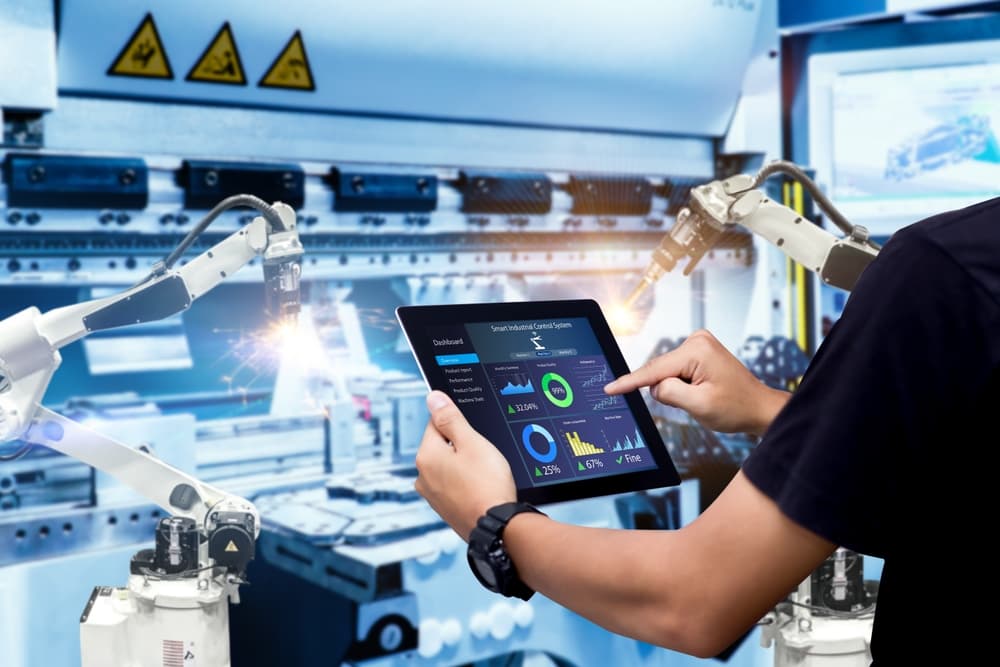A manufacturing execution system, or MES system, can fuel the evolution of your manufacturing processes and boost your operational efficiency.
A manufacturing execution system (MES) is an information management system that connects critical manufacturing systems and software within a facility.
An MES system primarily supports process management within the manufacturing setting, but leading options also assist with contract management, output optimization, and various other manufacturing functions.
An MES bridges the gap between a manufacturer's enterprise resource planning (ERP) technology and process-control systems on the factory floor.
By facilitating connections between a manufacturer’s software solutions, an MES provides enhanced flexibility, real-time visibility into the organization’s workflow, and valuable insights they can use to optimize manufacturing operations.
We’ll explore the benefits of manufacturing execution technology and provide MES system examples to help you revolutionize your manufacturing processes.
MES benefits

The following are some of the most prominent manufacturing execution system benefits:
- Increased machine utilization
- Reduced WIP inventory
- Lower labor costs
- Reduced order lead time
- Elimination of manual data-entry processes
- Reduced manufacturing cycle time
- Better agility and speed to market
- Increased customer satisfaction
- Improved compliance
- Decreased waste
An MES can transform your operations and set the stage for superior efficiency when paired with a robust ERP, product lifecycle management (PLM) software, and effective process-control systems. You can identify and eliminate sources of waste, increase output, and better serve your trade partners and customers.
The evolution of MES and its main functionalities
In 1996, the Manufacturing Enterprise Solutions Association (MESA) International published the MESA-11 model, which defined the scope of manufacturing execution systems. MESA supports the continued improvement of manufacturing operations management by strategically implementing IT resources.
Under MESA-11, MESA identified 11 essential manufacturing execution system functions:
- Resource allocation and status
- Document control
- Performance analysis
- Process management
- Operational management
- Dispatching production units
- Product tracking and genealogy
- Labor management
- Quality management
- Maintenance management
- Data collection and acquisition
Since its inception, MESA has developed multiple new models. The most recent, the Smart Manufacturing Model, focuses on incorporating new technologies.
MESs are integrated into the Purdue Reference Model under the ANSI/ISA-95 standard to produce a functional hierarchy for enterprise control. The model outlines five distinct levels:
- Level 0: The physical processes of manufacturing
- Level 1: Intelligent devices, such as sensors and actuators
- Level 2: Control systems, such as supervisory control and data acquisition (SCADA) software
- Level 3: Manufacturing operations systems, including MES systems
- Level 4: Business logistics systems, including ERPs or MRPs
In this hierarchy, MES systems are positioned at Level 3, indicating that they bridge the gap between the ERP technology and process-control systems located at Levels 1 and 2.
Today, MES solutions are used across a wide range of industries, including:
- Pharmaceutical manufacturing
- Electronics and tech
- Consumer goods
- Food and beverage
- Industrial manufacturing
Organizations in these sectors rely on MES systems for their many benefits, including better transparency, increased efficiency, and cost savings.
How do MES and ERP relate?
Enterprise resource planning solutions and manufacturing execution systems are distinct yet complementary technologies.
An MES system connects your ERP to physical processes and process-control systems. It evaluates mid-level processes and functions, such as the efficiency of supervisory systems. The ERP, meanwhile, provides a holistic view of your facility and operations, supporting high-level tasks like scheduling and planning.
Your ERP provides a view of the big picture. It connects the dots between your systems, processes, and technology so you can see how your operations interact. It lets you tap into real-time data insights, identify potential bottlenecks, and navigate production or output issues.
An MES provides more granular data, helping you determine how to solve specific process- or machinery-related business challenges.
If you use a material requirements planning (MRP) platform instead of an ERP, an MES system can also connect your process-control systems to your MRP solution. MES systems can connect manufacturing process-control systems with various high-level technologies, including a transportation management system.
Leading manufacturing execution system vendors
If you’re considering investing in a manufacturing execution system, you have plenty of vendors to choose from. Some of the top MES vendors include the following:
- Siemens A.G.
- Apriso Corp.
- Aspen Technology Inc.
- Rockwell Automation Inc.
- Epicor Software Corp.
- Aegis Ltd.
- Schneider Electric S.E.
- IQMS
- ABB
Choosing an MES

Some vendors offer specialized MES solutions designed to integrate with leading ERP platforms like Oracle NetSuite or Acumatica. Other vendors, such as Epicor, offer entire technology suites that include multiple pieces of complementary technology.
If you’re happy with your current ERP, you should find a solution that integrates with your existing technology. But if you want to overhaul your entire operation, consider a provider that offers a larger suite of applications.
Here are some other common considerations when selecting an MES:
Should I use a cloud-based or on-premises deployment?
Deciding between a cloud-based or on-premises deployment is tough. Each approach offers a mix of benefits and potential drawbacks.
A cloud-based deployment boasts exceptional scalability. If you need additional computing resources or storage, you can access it almost instantly. Additionally, the cloud can save money and expedite your implementation process.
However, a cloud-based MES can create challenges if some of your systems — such as your ERP — are already managed on-premises.
On the other hand, on-premises deployments give you optimal control over your MES. The downside? They tend to be far more costly, both upfront and in the long run.
With an on-premises deployment, you’re responsible for maintaining your system, servers, and other hardware. And if you need more computing resources, you’ll have to purchase additional servers.
Is an MES right for my business?
There are a multitude of benefits associated with using an MES. With the right technology, you’ll gain better visibility into your operations, optimize resource utilization, and increase productivity. An MES also supports compliance by improving traceability and providing critical business insights.
That said, an MES isn’t suitable for every business. If you manage a smaller manufacturing operation, the scale and scope of your business may not warrant an additional software system, such as an MES.
As with any technology investment, the best approach is to weigh your options.
Consider what you hope to achieve by expanding your technology stack and determine whether an MES will support those objectives. Also, consider the short and long-term costs associated with deploying new technology, as the licensing and integration expenses can be significant.
Achieve optimal visibility with Orderful
Integrating an MES system into your workflow will help streamline process management and better serve your trading partners.
If you want to achieve optimal operational visibility and tear down communication barriers between your organization and its partners, you’ll also need a modern EDI solution. Orderful provides an API-powered EDI platform to help you communicate and exchange data easily, efficiently, and accurately.
To learn more about Orderful, schedule a time to speak with an EDI expert today.
1.avif&w=2048&q=75)